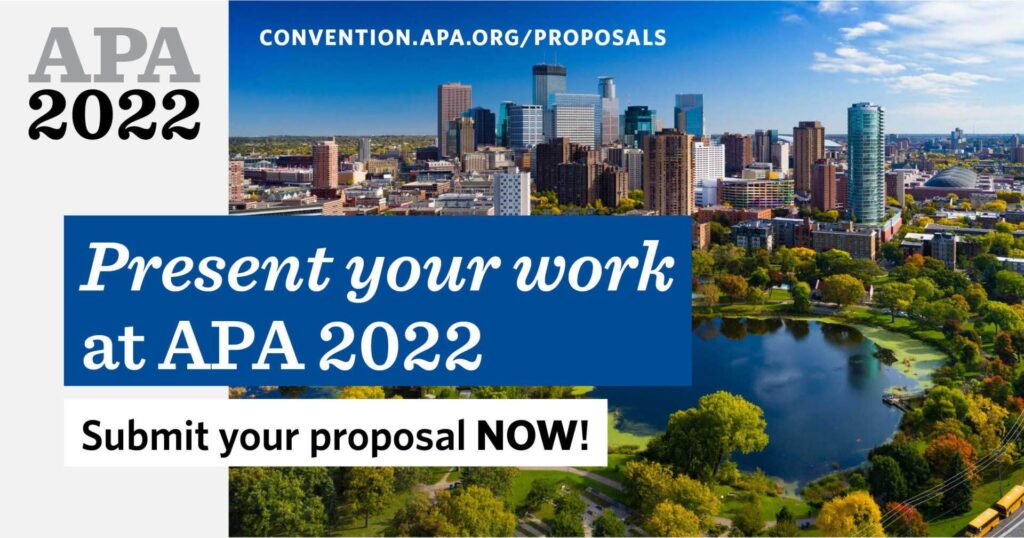Didn’t make it to APA 2024 in Seattle this year? Make sure to join us next year in Denver, CO! It is never too early to start planning — consider submitting a program proposal for a poster or session to APAGS. There may be a chance for you to receive a registration waiver as a first author of an accepted program or poster. Look for information on the APAGS Call for Proposals coming out in the Fall.
Here are some reflections from our APAGS members about their time at APA2024.
Karla Giron, APAGS Ambassador
“Browsing through Browsing through the convention agenda days before it started, I was excited at the thought of meeting like-minded individuals, seeing plenty of innovative research ideas, and being surrounded by the buzz of energy from the APA convention. This would be my first time in Seattle and my first time attending an APA convention!”
Some of my Convention highlights:
Erasure and Consequences: The Hidden Toll of Marginalized Psychologists’ Exclusion
A Critical Conversation led by Dr. Konjit Page from Fielding Graduate University in which Dr. Page discussed her experience taking and teaching the History & Systems course required of clinical/counseling psychology programs. She notes that the curriculum is largely outdated and omits the impact of psychologists from marginalized communities. Omitting these individuals hinders the development of psychologists, inhibits growth within the field of psychology, and fails to address the needs of BIPOC communities.With these concerns in mind, Dr. Page restructured her course to center BIPOC psychologists from the last 20 years who have made significant contributions to the field.
Grant Writing for Graduate Students: Identifying Opportunities and Crafting Competitive Applications
This session provided advice on how to apply for grants as a graduate student. This session was so packed that attendees were standing to the side and even sitting on the floor. I believe this speaks to the importance of grant funding availability to graduate students!
Some helpful tips I gathered from the session:
- Do not limit yourself to psychology grants, as many other grants may fit your specific research interests. Search also for similar topics, like mental health, or specific methodologies that apply to your research.
- Utilize search engines to your advantage – search for program announcements (PAs) and requests for proposals (RFPs)
- Look at the CVs of people you admire and see what grants they have received!
- The APAGS Psychological Science Research Grant (PSRG) is a great opportunity for funding! – https://www.apa.org/about/awards/apags-science?tab=1
Some other activities/events that inspired me:
- Volunteering for Division 17’s Liberation Lounge
- Attending Division 44 poster sessions
- A symposium on documenting immigrant trauma and another on advancing social equity in psychological science.
- Meet Your Leaders events were a great opportunity to meet other psychology graduate students outside of my home program and learn about student leadership opportunities.
- And off course I also strolled through the Solutions Center – an enormous space filled with booths, books, activities, and all kinds of giveaways.
I had a great experience at the 2024 APA Convention and will be looking forward to APA 2025 in Denver, CO!
Matt Hutnyan, APAGS Science Committee Member
“In August, I attended the APA annual convention for the first time. It was an excellent opportunity to meet leaders in our field, learn about advancements in psychological science, share research and professional knowledge, and connect with many peers who are engaged in inspiring research, advocacy, and clinical work.”
Some highlights included hearing from keynote speakers on important topics such as loneliness and artificial intelligence, engaging in conversations with early career psychologists, and enjoying the beautiful Pacific Northwest landscape and the city of Seattle.
Sitting in my hotel room after a long three days, I jotted down a few takeaways from my experience to share with the APAGS community:
1. Diversify your itinerary. As is true in investing, diversifying your itinerary is key to a successful convention experience. APA offers a wide variety of programming — opportunities to hear about cutting edge research, network with other students, professionals, and community members, build skills, engage in critical conversations, and so on. For those who are research-oriented like me, it can be tempting to focus on keynotes, symposia, and poster sessions. I also talked with folks who were most excited to socialize and engage in informal networking and professional development opportunities. Balance is key. Although I went into APA most excited for specific divisional events and talks focused on research and clinical practice, I thoroughly enjoyed social hours and learned a lot at informal discussions about professional issues in psychology.
2. Don’t overcommit. When APA publishes the full program, it can be overwhelming. There are hundreds of events. With so much programming, it can be easy as an eager first-time attendee to fill every hour of the day. The initial draft of my itinerary, for example, had me in a chair from 7:00 a.m. to 7:00 p.m. on the first day of the convention. As I quickly realized, convention is tiring. By noon, I was ready for a break. Actively listening, talking, presenting posters and papers, and walking around all day can take a toll physically and emotionally. It’s crucial to build in time to relax, eat, have a coffee break, go for a walk, connect with friends, browse the exhibitor and APA booths, and to explore the city. I would recommend anchoring your schedule around your presentation(s) if you have any and choosing a few nonnegotiable sessions each day that excite you the most. Let the rest of your schedule be flexible and build in time for yourself.
3. Take a chance. The thought of engaging with hundreds of people can be overwhelming for most of us. Creating balance in your itinerary and space for yourself to rest, relax, and reflect may reduce stress and anxiety that you might experience during the convention. It is also important to believe in yourself and to take chances with the goal of making the most of your time. Introducing yourself to someone new, asking for someone’s email, going to a session outside of your primary area of study, or asking a question during a presentation may be daunting. Exploring discomfort with these sorts of actions may be helpful and engaging in them can create unexpected connections and opportunities. For example, I attended a speed-mentoring event hosted by a division that I’m not a member of. I was nervous and didn’t know what to expect. I even considered not attending at the last-minute. To my surprise, I had mutual connections with some of the mentors, learned a ton about career development, and met leading professionals I wouldn’t have otherwise. Stepping outside of your comfort zone can create exciting opportunities, especially in the context of APA where there are so many people to meet and so much to learn.
APA 2025 will be here before you know it. I look forward to another great convention next year in Denver (August 7-9), and I hope to see you there!



 Professional conventions are an integral part of the graduate school experience.
Professional conventions are an integral part of the graduate school experience. 